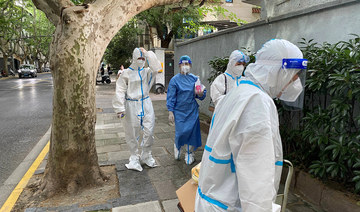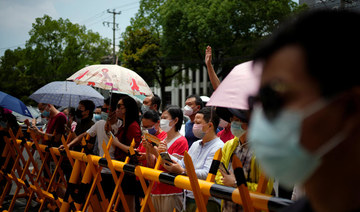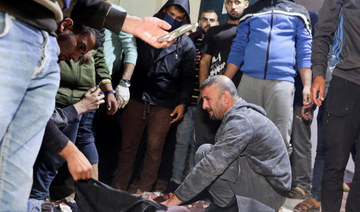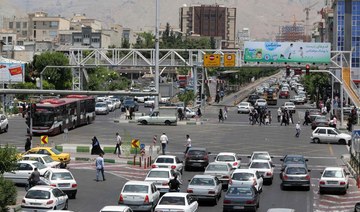SHANGHAI/BEIJING: Several large Chinese cities including Shanghai are on alert due to new clusters of COVID-19 infections, rolling out repeated mass testing or extending lockdowns on millions of residents, with some measures triggering a public outcry.
China has reported an average of around 390 local daily infections in the seven days ending on Sunday, higher than about 340 seven days earlier, according to Reuters calculations based on official data as of Monday. That is tiny compared with a resurgence in other parts of Asia.
China is adamant about implementing its dynamic zero COVID-19 policy of eliminating outbreaks as soon as they emerge. Previously when a flare-up became a major outbreak, local officials had been compelled to take tougher measures such as month-long lockdowns, even at the cost of economic growth.
Persistent outbreaks and more closures could add pressure on the world’s second-largest economy, which contracted sharply in the second quarter from the first after widespread COVID-19 lockdowns jolted industrial production and consumer spending.
The commercial hub Shanghai, yet to fully recover from the harsh two-month lockdown in spring and still reporting daily sporadic cases, plans to hold mass testing in many of its 16 districts and in some smaller areas where new infections had been reported recently, after similar testing last week.
“There is still an epidemic risk at the community level so far,” the city government said in a statement.
Shanghai reported more than a dozen new cases but none was found outside quarantined areas, local government data showed on Monday.
“I’m speechless,” said a Shanghai resident surnamed Wang, already subject to testing every weekend at her residential compound. “It sounds like a waste of resources that doesn’t address the real problem.”
The northern city of Tianjin, which launched multiple rounds of mass testing in recent months to curb earlier outbreaks, said on Monday it is again testing its more than 12 million residents, after two local infections were found.
In the central Chinese city of Zhumadian, lockdowns for more than a million people in two towns under its jurisdiction are extended for a few days until Tuesday. Temporary lockdowns for over 3 million in four other towns have been extended to Monday. Zhumadian continues to report dozens of cases daily despite curbs last week.
The southwestern city of Chengdu on Monday said it suspended various entertainment and cultural venues, widening such curbs over the weekend that had been limited to a few districts.
The capital Beijing, after a week of zero local infections, found two local cases on Monday — one international flight crew member and the person’s roommate. Authorities have sealed up affected buildings.
Authorities in the southern region of Guangxi said late on Sunday they removed two officials in the city of Beihai from their jobs for acting poorly in their COVID-19 response.
The city of Beihai, with a population of 1.9 million and currently clocking over 500 infections, has launched multiple rounds of mass testing and locked down some areas.
As of Sunday, over 2,000 tourists were stuck in the city.
In the southern city of Guangzhou, COVID-19 control staffers broke down the locks of apartment doors without residents’ consent, stirring an outcry on social media over the weekend.
Authorities in one district in Guangzhou on Monday apologized to residents.
The issue was among the top 10 list of topics trending on China’s Twitter-like social media Weibo.
“It’s too horrifying, too ridiculous,” wrote a Weibo user. “No humanity, no law.”
In the northeastern city of Changchun, clear of local infections since mid-May, subway passengers were told to wear N95 masks throughout their rides. Many cities including Beijing only mandate surgical masks.
Jin Dong-yan, a virology professor at the University of Hong Kong, said N95 respirators are able to offer better protection than surgical masks during major outbreaks, but could be of low cost-efficiency in areas of low COVID-19 risk.
“In a city without cases, N95 mask mandate would be painful and inconvenient.”
Shanghai enforces new COVID-19 testing, some areas in China extend lockdown
https://arab.news/6smav
Shanghai enforces new COVID-19 testing, some areas in China extend lockdown

- China has reported an average of around 390 local daily infections in the seven days ending on Sunday
- China is adamant about implementing its dynamic zero COVID-19 policy
Kenya, Tanzania brace for cyclone as heavy rains persist
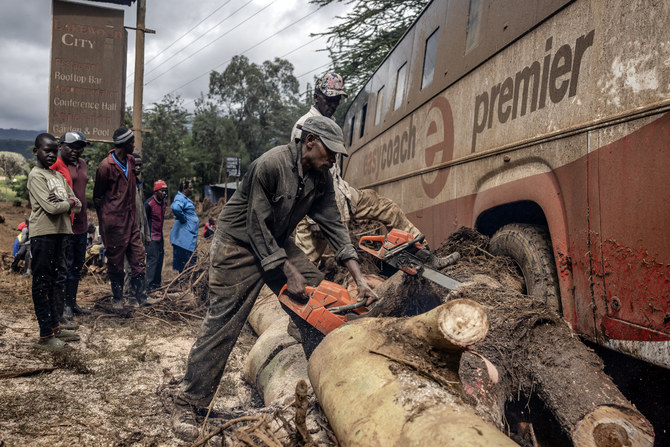
- The two East African neighbors are still recovering from last weeks devastating floods
- Kenya reported about 200 dead while Tanzaia said at least 155 died in floods and landslides
NAIROBI: Kenya and Tanzania were bracing Thursday for a cyclone on the heels of torrential rains that have devastated East Africa, killing more than 350 people and forcing tens of thousands from their homes.
In addition to claiming 188 lives in Kenya since March, the floods have displaced 165,000 people, with 90 reported missing, the interior ministry said, as the government warned citizens to remain on alert.
“Crucially, the coastal region is likely to experience Cyclone Hidaya, which will result in heavy rainfall, large waves and strong winds that could affect marine activities in the Indian Ocean,” the office of Kenyan President William Ruto said.
Neighbouring Tanzania, where at least 155 people have been killed in flooding and landslides, is also expected to feel the force of Hidaya.
“The presence of Hidaya Cyclone... is expected to dominate and affect the weather patterns in the country including heavy rain and strong winds in some Regions near Indian Ocean,” Tanzania Red Cross Society said on X, formerly Twitter.
Kenya’s capital Nairobi is among the areas expected to suffer heavy rains over the next three days, the Kenya Meteorological Department said on X, warning of strong winds and large ocean waves along the country’s coastline.
The forecaster urged residents to be vigilant for flash floods and lightning strikes, adding that strong winds could “blow off roofs, uproot trees” and cause other damage.
The heavier than usual rains have also claimed at least 29 lives in Burundi, with 175 people injured, and tens of thousands displaced since September last year, the United Nations said.
Earlier this week Ruto announced he was deploying Kenya’s military to evacuate everyone living in flood-prone areas.
In a bulletin released Thursday evening, the interior ministry ordered anyone living close to major rivers or near 178 “filled up or near filled up dams or water reservoirs” to vacate the area within 24 hours, warning that they would otherwise face “mandatory evacuation for their safety.”
The devastation has also affected Kenya’s tourism sector — a key economic driver — with some 100 tourists marooned in the famed Maasai Mara wildlife reserve on Wednesday after a river overflowed, flooding lodges and safari camps.
Rescuers later managed to evacuate 90 people by ground and air, the interior ministry said.
The area is currently inaccessible with bridges washed away, Narok West sub-county administrator Stephen Nakola told AFP, adding that about 50 camps in the reserve have been affected, putting more than 500 locals temporarily out of work.
There are no fatalities but communities living around the area have been forced to move away.
“Accessing the Mara is now a nightmare and the people stuck there are really worried, they don’t have an exit route,” Nakola said, adding that waterborne diseases were likely to emerge.
“I am worried that the situation could get worse because the rains are still on.”
In the deadliest single incident in Kenya, dozens of villagers were killed when a dam burst on Monday near Mai Mahiu in the Rift Valley, about 60 kilometers (40 miles) north of Nairobi.
The interior ministry said 52 bodies had been recovered and 51 people were still missing after the dam disaster.
Opposition politicians and lobby groups have accused Ruto’s government of being unprepared and slow to respond to the crisis despite weather warnings.
“Kenya’s government has a human rights obligation to prevent foreseeable harm from climate change and extreme weather events and to protect people when a disaster strikes,” Human Rights Watch said Thursday.
The United States and Britain have issued travel warnings for Kenya, urging their nationals to be cautious amid the extreme weather.
The devastation has sparked an outpouring of condolences and pledges of solidarity from all over the world, including from Pope Francis and UN Secretary General Antonio Guterres.
The rains have been amplified by the El Nino weather pattern — a naturally occurring climate phenomenon typically associated with increased heat worldwide, leading to drought in some parts of the world and heavy downpours elsewhere.
UK’s foreign secretary supported arms sales to Israel days after British aid workers killed in Israeli strike
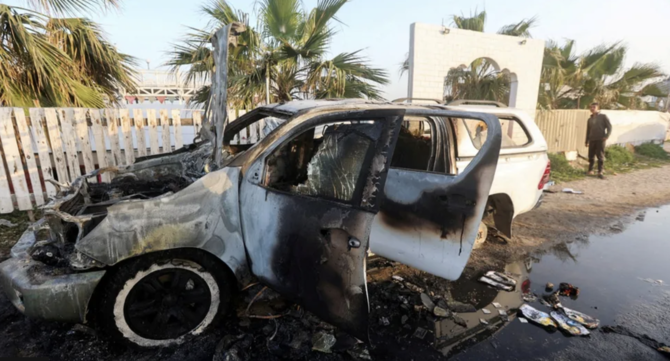
- Attack on World Central Kitchen convoy killed 7 people in total
LONDON: Britain’s foreign secretary recommended that the UK continue selling arms to Israel just days after an Israeli strike on a World Central Kitchen convoy killed three British aid workers.
David Cameron supported the continuation of arms sales two days after the strike on April 1, and the Secretary of State for Business and Trade Kemi Badenoch approved the decision on April 8, The Guardian reported on Thursday.
Cameron said earlier this week that the strike that killed the Britons, in addition to four aid workers of other nationalities, revealed systemic and personal failures by members of the Israel Defense Forces.
Cameron’s decision seems to have been based on an assessment of Israeli compliance with humanitarian law that did not cover the deaths of the aid workers due to a time lag in the government’s process for deciding if British arms exports were at risk of being used to commit war crimes.
There was a possibility that the business department’s assessment did not cover any incidents after Jan. 28.
An update on the handling of arms export licenses that took into consideration events up until the end of February was prepared, but the British Foreign Office has declined to say if that was included in the advice given to ministers.
Opposition Labour MPs claim the time delay means there is a possibility that no comprehensive ministerial-level assessment of Israel’s conduct of the war in Gaza has been made in the last three months.
Lawyers and campaigners who have examined the evidence provided by the Foreign Office have come to the same conclusion.
World Central Kitchen said on Monday it would resume operations in the Gaza Strip, a month after the Israeli airstrike.
Prior to halting operations, WCK had distributed more than 43 million meals in Gaza since October, representing by its own accounts 62 percent of all international nongovernmental aid.
NATO condemns Russian ‘malign activities’ on its territory

- The incidents “are part of an intensifying campaign of activities” Russia is carrying out across the Euro-Atlantic area
- NATO allies “express their deep concern over Russia’s hybrid actions, which constitute a threat to allied security“
BRUSSELS: NATO on Thursday condemned Russian “malign activities” on its territory, saying actions like disinformation, sabotage, violence and cyber interference threatened the alliance’s security.
The incidents “are part of an intensifying campaign of activities” Russia is carrying out across the Euro-Atlantic area and NATO allies “express their deep concern over Russia’s hybrid actions, which constitute a threat to allied security,” NATO said in a statement.
Authorities in the Czech Republic, Estonia, Germany, Latvia, Lithuania, Poland and Britain have recently investigated and charged people in connection with “hostile state activity.”
NATO said allies would work together to deter and defend against the hybrid actions and that they would remain steadfast in supporting Ukraine as it struggles to fend off Russia’s invasion, now in its third year.
Last month, a 20-year-old British man was charged with masterminding an arson plot against a Ukrainian-linked target in London. Moscow’s ambassador Andrey Kelin dismissed claims of links to Russia as “absurd” and “unfounded.”
In late March, Czech authorities said they had busted a Moscow-financed network that spread Russian propaganda and wielded influence across Europe, including in the European Parliament.
Israeli private eye arrested in UK over alleged hacking for US PR firm

- An initial attempt to extradite Amit Forlit to the United Sates was thrown out by a judge at Westminster Magistrates’ Court on Thursday
- Forlit was arrested under an Interpol red notice at London’s Heathrow Airport
LONDON: An Israeli private investigator wanted by the United States was arrested in London over allegations that he carried out a cyberespionage campaign on behalf of an unidentified American PR firm, a London court heard on Thursday.
An initial attempt to extradite Amit Forlit to the United Sates was thrown out by a judge at Westminster Magistrates’ Court on Thursday on a legal technicality.
Amy Labram, a lawyer representing the United States, had told the court that Forlit “is accused of engaging in a hack for hire scheme.”
Labram said that the US allegations include that an unnamed Washington-based PR and lobbying firm paid one of Forlit’s companies 16 million pounds ($20 million) “to gather intelligence relating to the Argentinian debt crisis.”
Forlit was arrested under an Interpol red notice at London’s Heathrow Airport as he was trying to board a flight to Israel, according to the USauthorities.
Forlit is wanted in the US on three charges: one count of conspiracy to commit computer hacking, one count of conspiracy to commit wire fraud and one count of wire fraud.
A judge ruled that the attempt to extradite Forlit by the United States could not continue as he was not produced at court within the timeframe required under British extradition law.
“He was not produced at court as soon as practicable and the consequences of that ... he must – I have no discretion – he must be discharged,” Judge Michael Snow ruled.
Forlit and his lawyer did not immediately return messages seeking comment. The Federal Bureau of Investigation did not immediately return a message.
Forlit has separately been accused of computer hacking in New York by aviation executive Farhad Azima. Azima, whose emails were stolen and used against him in a 2020 trial in London, is suing Forlit and others in federal court in Manhattan.
Forlit has previously acknowledged retrieving Azima’s emails but has denied hacking, telling Reuters he innocently stumbled across the messages “on the web.”
Death toll jumps to at least 48 as a search continues in southern China highway collapse
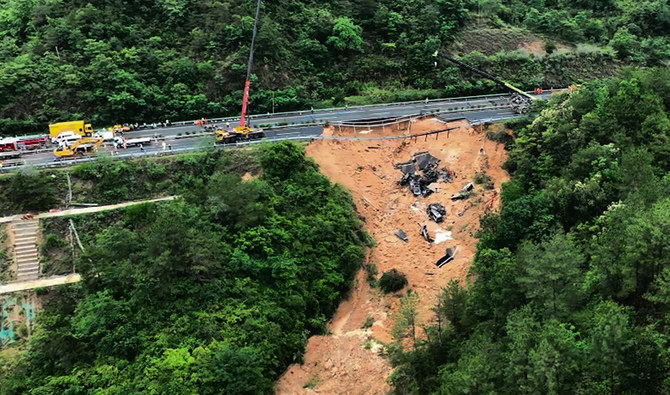
- One side of four-lane highway in Meizhou city gave way after a month of heavy rains
- Twenty-three vehicles fell down a steep slope, some sending up flames as they caught fire
BEIJING: The death toll from a collapsed highway in southeastern China climbed to 48 on Thursday as searchers dug for a second day through a treacherous and mountainous area.
One side of the four-lane highway in the city of Meizhou gave way about 2 a.m. on Wednesday after a month of heavy rains in Guangdong province. Twenty-three vehicles fell down a steep slope, some sending up flames as they caught fire. Construction cranes were used to lift out the burnt-out and mutilated vehicles.
Officials in Meizhou said three other people were unidentified, pending DNA testing. It wasn’t immediately clear if they had died, which would bring the death toll to 51. Another 30 people had non-life-threatening injuries.
The search was still ongoing, Meizhou city Mayor Wang Hui said at a late-afternoon news conference. No foreigners have been found among the victims, he said.
Search work has been hampered by rain and land and gravel sliding down the slope. The disaster left a curving earth-colored gash in the otherwise verdant forest landscape. Excavators dug out a wider area on the slope.
“Because some of the vehicles involved caught fire, the difficulty of the rescue operation has increased,” said Wen Yongdeng, the Communist Party secretary for the Meizhou emergency management bureau.
“Most of the vehicles were buried in soil during the collapse, with a large volume of soil covering them,” he said.
He added that the prolonged heavy rainfall has saturated soil in the area, “making it prone to secondary disasters during the rescue process.”
Over 56 centimeters (22 inches) of rain has fallen in the past four weeks in the county where the roadway collapsed, more than four times as much as last year. Some villages in Meizhou flooded in early April, and the city has seen more rain in recent days.
Parts of Guangdong province have seen record rains and flooding in the past two weeks, as well as hail. A tornado killed five people in Guangzhou, the provincial capital, during rain and hail storms last weekend.
The highway section collapsed on the first day of a five-day May Day holiday, when many Chinese are traveling at home and abroad.
Chinese leader Xi Jinping said that all of China’s regions should improve their monitoring and early warning measures and investigate any risks to ensure the safety of the public and social stability, state broadcaster CCTV said.



